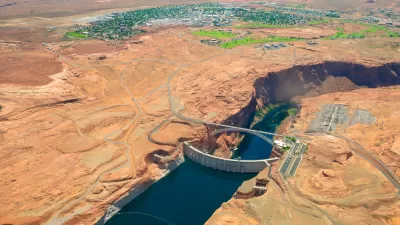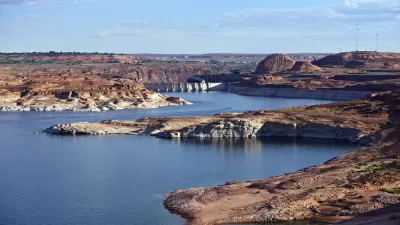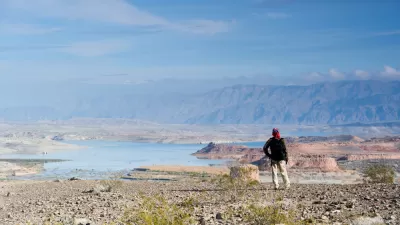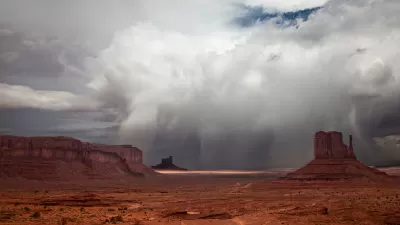Signs of worsening drought conditions in the American West are triggering early actions for states that depend on water from the Colorado River.

"Increasingly bleak forecasts for the Colorado River have for the first time put into action elements of the 2019 upper basin drought contingency plan," reports Luke Runyon.
Runyon adds: "The 24-month study released in January by the Bureau of Reclamation, which projects two years of operations at the river’s biggest reservoirs, showed Lake Powell possibly dipping below an elevation of 3,525 feet above sea level in 2022 That elevation was designated as a critical threshold in the agreement to preserve the ability to produce hydropower at Glen Canyon Dam."
The states of Colorado, Utah, New Mexico, and Wyoming will face "enhanced monitoring and coordination" in response to the drought forecast—and the trigger is intended to give water officials from those states advanced warning and time to prepare for the drought.
Similar drought response actions for the states on the lower basin of the Colorado River went into effect the year it was signed, according to Runyon, and Nevada, Arizona, and Mexico are already dealing with reduced water allotments.
Seven U.S. states and two Mexican states signed the historic Drought Contingency Plan in 2019. Since then, drought conditions have expanded across the river's watershed. In 2020, exceptional drought conditions reached 65 percent of the watershed.
FULL STORY: Upper Colorado River Drought Plan Triggered For First Time

Maui's Vacation Rental Debate Turns Ugly
Verbal attacks, misinformation campaigns and fistfights plague a high-stakes debate to convert thousands of vacation rentals into long-term housing.

Planetizen Federal Action Tracker
A weekly monitor of how Trump’s orders and actions are impacting planners and planning in America.

San Francisco Suspends Traffic Calming Amidst Record Deaths
Citing “a challenging fiscal landscape,” the city will cease the program on the heels of 42 traffic deaths, including 24 pedestrians.

Defunct Pittsburgh Power Plant to Become Residential Tower
A decommissioned steam heat plant will be redeveloped into almost 100 affordable housing units.

Trump Prompts Restructuring of Transportation Research Board in “Unprecedented Overreach”
The TRB has eliminated more than half of its committees including those focused on climate, equity, and cities.

Amtrak Rolls Out New Orleans to Alabama “Mardi Gras” Train
The new service will operate morning and evening departures between Mobile and New Orleans.
Urban Design for Planners 1: Software Tools
This six-course series explores essential urban design concepts using open source software and equips planners with the tools they need to participate fully in the urban design process.
Planning for Universal Design
Learn the tools for implementing Universal Design in planning regulations.
Heyer Gruel & Associates PA
JM Goldson LLC
Custer County Colorado
City of Camden Redevelopment Agency
City of Astoria
Transportation Research & Education Center (TREC) at Portland State University
Jefferson Parish Government
Camden Redevelopment Agency
City of Claremont





























